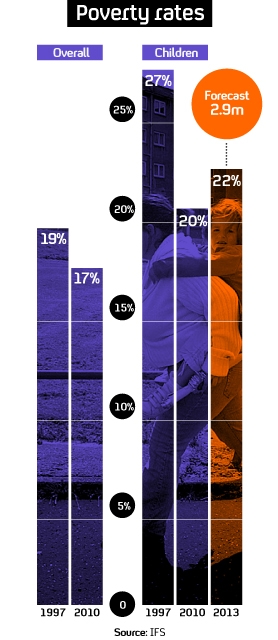Household incomes take biggest tumble in 30 years
Stagnant wages coupled with cuts to benefits prompts the biggest slide in household incomes in 30 years, a respected economic think-tank finds.

The typical British household saw its income fall by 3 per cent in the year to end of April 2011, the Institute for Fiscal Studies expects official figures to confirm.
This represents a loss of almost £1,000 a year for the average British household, which brings in £30,500 per annum, before tax and benefits.
“The trend in earnings and benefits suggests that such a fall is entirely possible,” the IFS said.
IFS research shows that initially despite climbing unemployment, the average British household weathered the recession with incomes rising in both 2008-2009 and 2009-10. Their figures show that median incomes in 2008-9 grew by one per cent. The IFS takes the median income as a more true representation of the economic picture as “average incomes” are pulled up by the highest earners.
The outlook for incomes in 2010-11 is considerably bleaker. Wenchao Jin, IFS
However Wenchao Jin, research economist at the IFS, said: “The figures released today tell as story of pain delayed, but not pain avoided.
“Average living standards rose over the recent recession, likely to be driven by large increases in benefits and tax credit rates.”
Yet, in the long term these economic boosters cannot be sustained, he said. “The outlook for incomes in 2010-11 is considerably bleaker,” Mr Jin added.

While official figures from the Office for National Statistics have yet to be released, IFS research shows that average earnings in 2010-11 fell by 3.8 per cent in real terms over the first 11 months of 2010-11.
If the ONS’s official data confirms the IFS’s fears of a three per cent drop in household incomes, the fall would represent the largest slide in median incomes since 1981 – leaving median incomes closer to their 2004-05 levels.
Earlier this week, the Bank of England cuts its growth forecast for the UK economy, explaining that the gloomier outlook reflected the dampening effects of rising energy prices and the impact that disappointing real wages will have on consumer spending.
Looking back at Labour’s 13 years in office, the IFS report concluded that both pensioner and child poverty had fallen to their lowest levels since the 1980s.
However, David Philips, a senior research economist at the IFS, warned that child poverty is now set to climb, in the wake of cuts to child benefits and tax credits.
“It seems almost certain that the last government’s target to reduce child poverty by half between 1998-99 and 2010-11 will be missed by a considerable distance,” Mr Philips said.
Meanwhile, income inequality was found to be largely unchanged – remaining close to its highest level since the early 1960s, when measurement began.
While pensioner and child poverty had improved, poverty among childless working adults continues to rise, and has now reached the highest level since records began. The IFS said much of this could be down to rising unemployment.
-
Latest news
-
Taylor Swift’s new break-up album breaks records3m

-
NHS trust fined £200K for failings that led to death of two mental health patients3m

-
Sunak vows to end UK ‘sick note culture’ with benefit reform3m

-
‘Loose talk about using nuclear weapons is irresponsible and unacceptable’, says head of UN’s nuclear watchdog3m

-
‘There wasn’t an Israeli attack on Iran,’ says former adviser to Iran’s nuclear negotiations team7m

-




